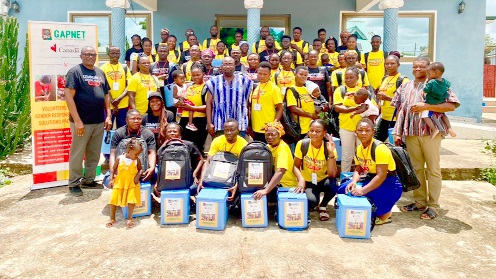
106 Community Animal Health Workers trained in Upper East
A total of 106 Community Animal Health Workers (CAHWs) have been trained to help provide proper animal health services towards improving livestock production in the Upper East Region.
Advertisement
The training formed part of a project dubbed “Volunteers Engaged in Gender Responsive Technical Solutions” (VETS) being implemented by Veterinarians Without Borders, Canada.
It was financially supported by Global Affairs, Canada, and the United Kingdom (UK) Department of Environment, Food and Rural, with the Ghana Poultry Network (GAPNET) as a local partner.
The beneficiaries were drawn from 38 communities, including the Kassena Nankana West District and the Kassena Nankana and Builsa North municipalities respectively.
At the end of the training, each participant was presented with a mobile phone on which the Food and Agriculture Organisation Event Mobile Application (EMA-I) has been installed to enhance animal health in their communities.
Also, vaccine flasks, carrier bags and other tools and equipment needed to assist in their work were presented to each of them.
Ceremony
At a ceremony to close a 10-day training of beneficiary CAHWs from the Kassena Nankana West and Kassena Nankana Municipality, the National Project Coordinator, Dorothy Asare, said the main purpose of the training was to improve livestock production in the beneficiary communities.
She noted that improving livestock production through good husbandry management and health delivery was key to food security, poverty reduction and rural development, saying “The core part of this training was to provide basic animal health care services in the communities.”
Other Trending Stories
According to her, “the services would be provided through the use of Telehealth innovation, which is the use of digital technology to deliver animal healthcare to livestock in rural communities in the beneficiary areas”.
Close gap
Ms Asare added that they were being deployed to go out there to close the gap of inadequate delivery of animal health services through animal health care information; basic care and services they had been taught during the training.
“You are going to serve as an interface between livestock holders and the Veterinary Service unit of the Ministry of Food and Agriculture (MoFA), by providing relevant information as quickly as possible,” she stated.
She said that the mobile phones would enable the animal health workers to perform their duties of providing information and quick feedback at the earliest possible time, stressing, “You are now the foot soldiers to help improve livestock production in your communities.”
She added that it was only when livestock production was improved that the goal of the project would be achieved successfully and stated further that GAPNET would provide the necessary motivation and measures for the CAHWs to work to ensure sustainable incomes for households.
She appealed for support from the chiefs, opinion leaders and community members towards ensuring the CAHWs discharged their duties to realise the objectives of the training.
Inadequate officers
The Upper East Regional Veterinary Officer, Dr Henry Nii Ayi Anang, welcomed the intervention by GAPNET and its funding partners, as there were not many veterinary officers in the region.
“As a unit, we are happy that GAPNET has come on board to train several community animal health workers to augment the few veterinary officers attending to animals in the entire region,” he said.
He cautioned them against going beyond their limit as CAHWs as well as professionally acting veterinary officers, saying “Your mandate is to offer primary health services to animals in your respective communities.”
Further, he urged the youth among the participants, who are passionate about the veterinary profession, to consider pursuing further studies to acquire either a certificate or a diploma to enable them to become professional veterinary officers.
The Regional Director of the Department of Food and Agriculture, Alhaji Zakaria Fuseini, said the training was important as it would enable the participants to contribute their quota to the growth of the livestock sub-sector.
Writer’s email: [email protected]




